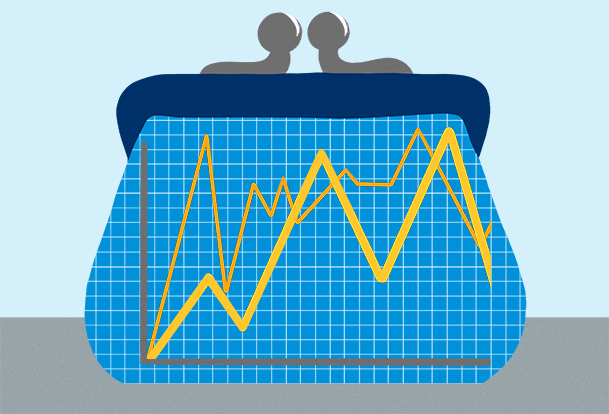Why Investors Buy Stocks
Published on May 6, 2019
minute read
Share:
You probably understand more than you realize about the basics of the stock market.
But maybe there are details on which you're a bit foggy — why people invest in the market, what drives a stock price higher or lower, and all that business about bulls and bears.
You're not alone. Most Canadians admit there are areas of finance they don't fully grasp. And when it comes to stocks, there's a lot to know.
Stocks, shares, equities — it's really three ways of saying the same thing. Whatever you call them, they generally fall into two categories: common and preferred.
Most shares are common ones, as the name suggests. They usually come with voting rights, typically one vote per share, giving the owner the power to decide things like who sits on a company's board of directors. That board will hire and fire the CEO, and decide how much profit is returned to stockholders. Preferred shares, meanwhile, don't come with voting rights, but they do come with a fixed dividend payment.
Dividends are one key way for stockholders to make money from equities. A rise in the intrinsic value of the stock, or earnings per share, is another. An increase in the valuation of company earnings or other assets, measured by the price-to-earnings ratio, is a third.
When you buy stock in a company, you are basically buying a small part, or share, of that company. Your sliver of ownership entitles you to a relative share of the company's profits — and its losses.
So what drives a share price higher or lower?
At its simplest level, the market is an auction, with prices determined by supply and demand. When demand exceeds supply, sellers can charge a higher price. When supply outstrips demand, buyers can drive the price lower.
Predicting demand is the hard part. It can rise or fall based on lots of factors — news from inside the company or around the industry, indicators about the broader economy, political uncertainties, even the effects of weather events.
Company news
You've seen this play out before. A company unveils an exciting new product and the share price leaps. Or it announces a cyber breach, and the share price falls. Layoffs, mergers or acquisitions, management changes, fraud scandals — they all have an impact on the stock price, as investors calculate whether the move will result in more money for shareholders, or less.
Industry news
Sometimes, good news from one company cascades across an industry. If an automaker forecasts higher demand for cars, for example, other automakers might see their stock prices rise, too. In fact, the news might also boost stocks of other consumer goods — athletic shoes, electronics, retailers — particularly if it signals an improving economy. Bad news, meanwhile, can have the opposite effect, dragging everyone down.
As always, it helps to do research before you invest to make sure an investment is right for you.
Economic news
When the economy is expanding, creating jobs, and stoking demand for goods and services, the appetite for stocks also rises, with companies expected to realize stronger profits. When an economy is slowing, or contracting, stock prices flatten or fall, in anticipation of weak earnings.
A healthy labour market and strong gains in gross domestic product mean a healthier consumer, which can be a positive for stocks. But that can also lead to higher consumer prices, or inflation, as demand for goods increases. Inflation can itself have a slowing effect on sales and profits, particularly when it leads to higher interest rates.
That's why investors keep watch on the economic outlook, parsing data for hints of its future direction.
Bulls, bears and market sentiment
Now about those bulls and bears. When investors feel confident in the stock market, they're bullish, buying up shares and sending prices higher. When they're fearful, they're bearish, selling and sending prices lower.
Why bulls and bears? It's said to relate to the way they attack. Bulls thrust their horns upward; bears extend their claws and slash down.
RBC Direct Investing Inc. and Royal Bank of Canada are separate corporate entities which are affiliated. RBC Direct Investing Inc. is a wholly owned subsidiary of Royal Bank of Canada and is a Member of the Investment Industry Regulatory Organization of Canada and the Canadian Investor Protection Fund. Royal Bank of Canada and certain of its issuers are related to RBC Direct Investing Inc. RBC Direct Investing Inc. does not provide investment advice or recommendations regarding the purchase or sale of any securities. Investors are responsible for their own investment decisions. RBC Direct Investing is a business name used by RBC Direct Investing Inc. ® / ™ Trademark(s) of Royal Bank of Canada. RBC and Royal Bank are registered trademarks of Royal Bank of Canada. Used under licence.
© Royal Bank of Canada 2022.
Any information, opinions or views provided in this document, including hyperlinks to the RBC Direct Investing Inc. website or the websites of its affiliates or third parties, are for your general information only, and are not intended to provide legal, investment, financial, accounting, tax or other professional advice. While information presented is believed to be factual and current, its accuracy is not guaranteed and it should not be regarded as a complete analysis of the subjects discussed. All expressions of opinion reflect the judgment of the author(s) as of the date of publication and are subject to change. No endorsement of any third parties or their advice, opinions, information, products or services is expressly given or implied by RBC Direct Investing Inc. or its affiliates. You should consult with your advisor before taking any action based upon the information contained in this document.
Furthermore, the products, services and securities referred to in this publication are only available in Canada and other jurisdictions where they may be legally offered for sale. If you are not currently a resident of Canada, you should not access the information available on the RBC Direct Investing Inc. website.
Inspired Investor brings you personal stories, timely information and expert insights to empower your investment decisions. Visit About Us to find out more.










